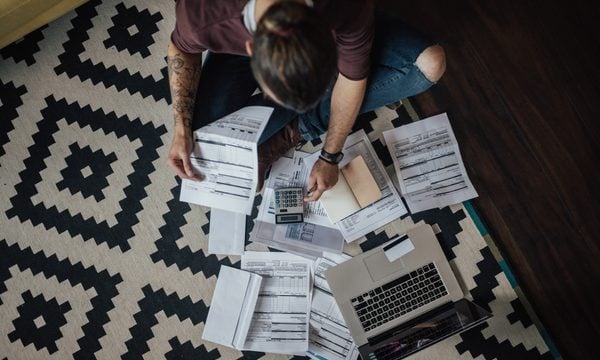How Much Does It Cost to File for Bankruptcy? (And How to Pay for It)
Bankruptcy costs anywhere from a few hundred dollars to a few thousand. You have a few payment options.

Many, or all, of the products featured on this page are from our advertising partners who compensate us when you take certain actions on our website or click to take an action on their website. However, this does not influence our evaluations. Our opinions are our own. Here is a list of our partners and here's how we make money.
Filing for bankruptcy costs less than $400, but attorney fees (and you should probably have an attorney) can push total costs into the thousands. That’s daunting when you’re already in rough financial shape. But there are strategies for tackling bankruptcy fees.
Here’s what bankruptcy costs — and how to pay for it.
How much does it cost to file for bankruptcy?
You’ll face three bankruptcy expenses: court filing fees, credit counseling fees, and attorney fees for the bankruptcy lawyer who files your petition, helps you through the means test and represents you in court.
You'll generally have to decide if you want to file Chapter 7 or Chapter 13 bankruptcy. In a Chapter 7 bankruptcy, most of your debts will be forgiven (depending on type). In a Chapter 13 bankruptcy, your debts are reorganized into a repayment plan, which can reduce what you owe while letting you keep key assets.
| Chapter 7 | Chapter 13 | |
|---|---|---|
| Filing fees | $338* | $313 |
| Attorney fees** | $1,500 - $2,500 | $2,500 - $5,000 |
| Credit counseling fees | $20 - $100* | $20 - $100 |
| Total | $1,858 - $2,938 | $2,833 - $5,413 |
| * Fee may be waived, depending on income. ** Attorney fees vary greatly; these are approximate ranges. | ||
Filing fees are the same nationwide, but attorney fees vary by location, the complexity of your case and the attorney. In general, they’ll be lower if you live in a rural area or have a simple case. A complex bankruptcy case in Manhattan, however, will likely cost several thousand dollars.
Credit counseling fees are nominal, but people filing for bankruptcy are required to complete both a credit counseling course and a debtor education course to complete the bankruptcy process.
If you’re filing for Chapter 13 bankruptcy, your court will review your attorney fees unless they fall below the so-called “no-look” level that’s recognized as reasonable. This level varies from one district to another, so check with your local court before hiring an attorney.
How to pay for bankruptcy costs
Filing Chapter 13 means you have the financial footing to structure a repayment plan for your debts — including attorney fees — after you’ve filed.
But if you’re in enough financial distress that you need to file Chapter 7 — and your income is low enough to qualify — you’ll likely need to pay your attorney before they file your case. If you can’t afford these costs, you can:
- Raise the money.
- Work out a payment plan before filing.
- Go pro bono, which means finding an attorney who will take your case free of charge.
The first option takes creativity and hard work. The others require you to prove financial need, so gather documentation of your income and expenses, as well as your tax statements, before meeting with any legal counsel.
1. Raise the money
First, minimize your outgoing cash.
“If you’re still paying your credit cards, stop paying them,” New Jersey bankruptcy attorney John Hargrave says. “You’re just throwing that money away if you’re going to file. Save that money and put it toward your bankruptcy.”
Unsecured debts, such as credit card bills, are wiped out by a Chapter 7 bankruptcy, so it doesn’t make sense to keep paying them if you’re certain about using this debt relief option. (But make sure you really qualify for Chapter 7 before you stop paying your bills, lest you wind up in even hotter debt water.)
Next, try to earn some additional income. Selling old electronics or taking on a part-time job are two ways to earn some fast cash.
If you’ve already sold your old smartphone and started a dog walking service but still don’t have enough to cover your bankruptcy, try asking family and friends for help.
2. Work out a plan
You might be able to spread out the costs of your attorney and filing fees.
The first step is finding the right attorney. In this case, that means one who has expertise, is a good communicator, charges a fair price — and is willing to receive payment over time. Ask any lawyer you’re considering about the possibility during your initial meeting.
Payment plans vary, but most lawyers handling Chapter 7 bankruptcy will want payments completed before filing your case: Since Chapter 7 wipes out most of your debts, you wouldn’t be legally obligated to pay your attorney any outstanding fees after filing. That’s just not a sustainable business plan.
But you can still get some benefit, even while you’re making the payments, Hargrave says. Once you officially hire a lawyer, they can take calls from creditors on your behalf. When you discuss setting up a payment plan, ask how much of the fee you must pay before the lawyer will begin taking calls.
“When people hire a bankruptcy lawyer, they know the fear of going to the mailbox, the fear of what phone call is going to come next — that evaporates when you hire an attorney,” Hargrave says.
Later, your attorney can work with the court to set up a payment plan for your bankruptcy filing fee. The $338 fee can be split into as many as four payments.
3. Go Pro Bono
You might qualify for free legal services or waived fees if your income is less than 150% of the poverty level for your family size and you’re unable to afford a payment plan.
There are a few ways to find a pro bono attorney. First, ask your local bankruptcy court for information about free legal clinics and local free legal aid resources. If you meet their guidelines, these organizations might be able to offer some help or connect you with pro bono bankruptcy attorneys.
But be prepared: Legal aid organizations are often underfunded and overworked. Still, it's wise to get on the waiting list with one while you continue to pursue other options.
The National Association of Consumer Bankruptcy Attorneys has a search tool to help you find attorneys in your area.
You can also reach out to your state or local bar association, which may have a list or referral service. Some firms require attorneys to take on a certain amount of pro bono work each year.
Lastly, you can hire a petition preparer instead of an attorney if you’re in a hurry to file. They can help you fill out your paperwork for a fee that varies but is generally capped at $100 to $200. A petition preparer can’t give you the legal advice that an attorney can provide, but this is an option if you just want to file your bankruptcy in order to trigger the “automatic stay” that halts collection efforts.
Looking for an alternative product to pay down your debt?
Learn more about our debt relief partners belowWhat about DIY bankruptcy?
If you’re thinking of filing on your own, without any legal assistance, Hargrave has one piece of advice: Don’t.
“There’s a jeopardy in doing a bankruptcy by yourself,” he says. “Even if you’re a well-educated, articulate person, the law still has a lot of jargon and technical stuff that you, without assistance of a lawyer, could screw up.”
Of people who represented themselves in filing for Chapter 7 bankruptcy in 2018, more than 36% of cases were dismissed for incomplete filings, compared to only 2.2% of cases filed by attorneys, according to data from the U.S. Bankruptcy Court in the Central District of California, which sees a large number of self-represented litigants. And of all the 2018 Chapter 7 cases that were successfully discharged in that court, only about 8% weren’t attorney-represented.
There are multiple places in bankruptcy paperwork to make a mistake, and if the court throws out your case, it’s a big waste of time and effort.
Frequently asked questions
How much does it cost to file Chapter 7?
The filing fee for Chapter 7 bankruptcy is $338, although this fee may be waived depending on your income. You’ll also need to complete a credit counseling and debtor education course, which typically cost $10 to $50 each. People filing for bankruptcy are typically encouraged to use an attorney, and fees for attorneys generally range from $1,500 - $2,500, although they may be higher or lower, depending on your city.
How much does it cost to file Chapter 13?
Filing for Chapter 13 bankruptcy typically involves a court fee of $313, which generally can’t be waived. In addition, you’re required to complete credit counseling and debtor education courses, which usually cost $10 to $50 each. Most people also hire an attorney, and Chapter 13 legal fees are generally higher than those for Chapter 7 — often ranging from $2,500 - $5,000 — though the exact amount can vary by location and complexity of the case. The good news is that you can usually pay the lawyer’s fee over time as part of your repayment plan.
Which bankruptcy clears all debt?
No bankruptcy clears all debt, but Chapter 7 will clear most unsecured debt, such as credit card and medical bills. That said, some unsecured debt is nondischargeable, meaning it generally can’t be wiped out. This includes most student loans, child and spousal support, and recent tax debt.
Do I still owe money after bankruptcy?
This depends on the kind of debt you have. If all your debt was unsecured debt like credit card and medical bills, filing for Chapter 7 bankruptcy will clear it and you won’t owe money afterward. But if you have debt like past due child support, spousal support, recent taxes or student loans, those are typically not clearable by bankruptcy so you will still have to make payments.
Article sources
NerdWallet writers are subject matter authorities who use primary,
trustworthy sources to inform their work, including peer-reviewed
studies, government websites, academic research and interviews with
industry experts. All content is fact-checked for accuracy, timeliness
and relevance. You can learn more about NerdWallet's high
standards for journalism by reading our
editorial guidelines.
On this page
Related articles










